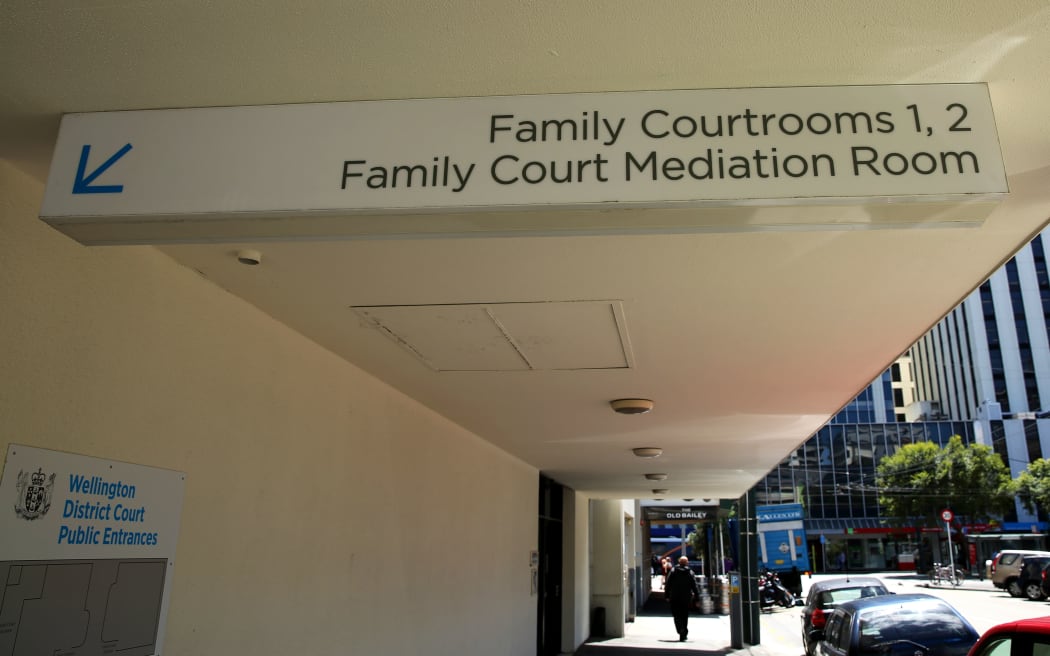A heavily-pregnant woman whose child has been ordered back to Australia under a child abduction treaty believes her rights are being breached.

Amy lost her case in the Family Court to block the Hague Convention application. Photo: RNZ / Alexander Robertson
The woman lost a Family Court case on 7 November and is being pursued by the authority dealing with Hague Convention cases to send her daughter to Australia immediately.
But the Central Authority of New Zealand is doing so without waiting out the 20 working days the woman has to appeal the decision, which her lawyer said breaches her rights.
Amy, who's real name is suppressed, fled Australia last year with her one-year-old daughter after seeking a violence order following beatings from her former partner.
She tried to stay in Australia but a lack of government support for New Zealanders forced her into a move back home.
But when she left, Amy was breaching a child abduction treaty called the Hague Convention.
The UN convention was created in 1980 to force the return of a child when one parent takes them from their country of residence.
Three weeks ago, Amy lost her case in the Family Court to block the Hague Convention application.
"The steps taken by the Central Authority to require her to return to Australia before her appeal period is up would be a breach of her rights, and I'm going to argue that with the court," her lawyer, Daniel Vincent, said.
Mr Vincent has worked on five Hague Convention cases in the past year. Four of those cases involved domestic violence victims fleeing their abusive partners.
He'll be in court on Friday arguing against the efforts of authorities to take Amy's child back to Australia so soon.
"Certainly, I think the Central Authority and what it's asking for is not right, and would lead to her effectively losing her appeal rights if it was ordered.
"There'd be no point in appealing a decision to return to Australia, if you had to return to Australia while the appeal's being considered.
"That would be pointless to take the appeal, and that's the very point I'm going to be making to the court."
Mr Vincent said he had already filed an appeal to the High Court, and yet the Central Authority which deals with Hague cases is still seeking for the child to be sent to Australia.
Complicating the case further is the fact that Amy is 33 weeks pregnant to a man in New Zealand.
Because of her condition she would be unable to travel with the child, and her father said the case was having a serious impact on the baby's health.
"She's filing to have that held off because of her situation, because she's pregnant," Amy's father said.
"She's not able to fly because the doctors don't recommend it.
"The stress on her baby, that she's gone through through the pregnancy, her baby is really small for the size that it should be at this stage.
"They've identified a kidney problem with the baby, that one of the kidney's isn't functioning properly, which we think is most likely due to the stress she's going through."
Amy and her lawyer are facing an uphill battle to overturn the Family Court ruling.
Her former partner is the subject of a protection order in Australia, which names both Amy and her child.
But New Zealand law doesn't recognise domestic violence when dealing with Hague Convention cases.
The focus is solely on the wellbeing of the child, and whether the child could be harmed if returned to their country of residence.
Jeffrey Edleson of the University of California, Berkeley, is studying domestic violence and its link to the Hague Convention.
"It turns out that about half the homes where there's domestic violence, there's also abuse of the children," Mr Edleson said.
"It's been important to me that courts and attorneys and even implementing legislation recognises that a possible risk to the child on sending them back is that they'd be exposed to domestic violence.
"[It] raises the risk that they themselves could be abused, as well as the impact of just witnessing the domestic violence in their home."
Because New Zealanders are not entitled to a number of benefits, or legal aid, in Australia, academics say many women dealing with Hague Convention cases are forced back into a relationship with their abuser.
Mr Edleson said New Zealand should follow the lead of Japan and implement legislation that protects battered mothers in these cases.
Since the start of 2015, 85 Hague Convention applications have been filed seeking the return of a child from New Zealand to another country.
Fifty of those cases were successful, while just 16 saw the application dismissed.



